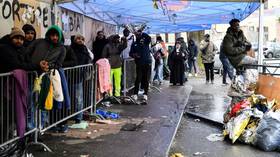As a despairing UK enters its 3rd lockdown, would we actually do them at all if they were assessed the same way vaccines are?

Lockdowns are the measure of first resort for many countries in the battle against Covid-19, but had we properly looked at their devastating side effects, governments would not be so keen on them.
After months of trials and painstaking inquiry into questions of efficacy and safety, December saw two vaccines approved by regulators in the UK – first, one made by Pfizer and BioNTech and a second, developed by Oxford University and AstraZeneca. There will continue to be great scrutiny of these vaccines to make sure there are few serious side effects and that they work properly.
But as people across the UK are told to stay at home, what would happen if the same process were applied to lockdowns and other restrictions – part of a group of measures properly known as 'non-pharmaceutical interventions'? If we followed the same template as for vaccines and drugs, we would ask (a) do they work and (b) do the side effects outweigh the benefits? Yet it seems that, in the rush to keep Covid at bay, politicians seem unwilling to seriously consider a proper assessment.
Also on rt.com Boris Johnson confirms new national lockdown for England as UK registers record Covid-19 casesDo lockdowns work to reduce the spread?
Since SARS-CoV-2, the virus that causes Covid-19, passes from person to person, the more that we are kept apart, the less likely we are to catch it. According to the WHO, we should particularly avoid close contact and spending long periods of time with others in poorly ventilated places.
So lockdowns should work, since they minimise all these different forms of person-to-person contact. However, apart from the fact that many workers still need to go out and do essential jobs, the effectiveness of lockdowns depends on compliance. Simply ordering people to behave in a certain way does not mean they will do so. In the spring, while there were many grumblings of discontent, the UK population stuck to the rules far more than was expected. It really shouldn't have surprised anyone that, in the face of a serious, new and rather mysterious illness, people acted to protect themselves.
But that compliance weakened as cases waned and we got a taste of freedom. While businesses are still kept shut down – and schools and colleges now join them – people have coped with social distancing rules by getting around them. Anecdotal evidence from London during the second lockdown that started in November suggests that get-togethers at pubs and restaurants were replaced with dinner parties and house parties. Perversely, lockdown meant that meeting in public in Covid-secure, well-ventilated places was replaced by clandestine gatherings in homes. If things change, it will be because people are afraid enough to comply once more.
Worldwide, the evidence for lockdowns is far from conclusive. Many of the countries with the worst case numbers per head of population were also those with the longest and toughest lockdowns: Peru, Belgium and Argentina, for example. Countries that were congratulated earlier in the year have since become Covid hotspots, like Slovenia and the Czech Republic.
Finally, as soon as lockdowns are lifted, case numbers seem to bounce back. That's what happened in Wales after a two-week 'fire break' lockdown from 23 October that was so strict that shoppers could only buy food and other essentials and whole supermarket aisles were covered in plastic sheeting to stop them browsing for anything else. Yet cases started rising immediately afterwards - and restrictions had to be imposed all over again.
So even in their own terms, lockdowns are at best a short-term delay on the spread of infection, perhaps buying time to allow health services to cope or to allow a more permanent solution, be it a cure or a vaccine. If this were a clinical trial, the benefits would be regarded as temporary at best.
Also on rt.com UK starts rollout of AstraZeneca’s Covid jab in world first but health sec warns supply problems are slowing vax programmeWhat of the side effects?
But the other side of the evaluation, the negative side effects, would be damning if lockdowns faced such a clinical evaluation. In the UK, even those fortunate enough to have received furlough payments because their workplaces were closed will have received no more than 80 percent of their normal wages. For people who rely on tips to top up their wages, this 20 percent cut in incomes would have been even worse. Many others, particularly the self-employed, were hit even harder, some deprived of any income at all. Business owners are losing their life savings because government support doesn't cover their losses.
Furlough payments rely on a business continuing to exist, but many firms have gone bust because of Covid restrictions. Unemployment has been creeping up but will hit hard when furlough schemes end. A report by the Joseph Rowntree Trust suggests two million people will soon be unable to pay for all the essentials of life, like shelter, food and energy. Globally, the situation is dire, with 81 million job losses in the Asia-Pacific region alone.
Closing schools in the UK once more means that millions of children will miss out again on chunks of their education, damaging their long-term prospects, particularly for the less well-off, who may struggle to learn at home. It also means missing out on the meals that schools provide, a problem in the UK, but a disaster in many poorer countries. For those who live in countries with weak welfare provision, the copycat lockdowns have been pointless, authoritarian and potentially life-threatening.
In wider health terms, the combination of the pandemic and the government reactions to it will cause enormous suffering in the long run. There's been much focus on the fact that cancer patients have had appointments and treatment delayed. The number of patients waiting over a year for all forms of NHS treatment has risen a hundredfold. There was too little emphasis in the spring on patients coming forward for treatment, resulting in excess deaths from heart attacks and more. Of course, the virus itself is responsible for much of this, but excessive delays in getting back to normal meant a huge backlog of treatment had built up.
The mental-health toll of lockdowns has been enormous. Millions of people remain cowed, desperate for social life to return but too scared to go out, while children lose out on the opportunity to see friends, greatly exacerbating normal childhood anxieties. Social workers worry about children being abused or mistreated in greater numbers while deprived of the relative safety of school. Divorce lawyers are among the big winners from lockdown.
Also on rt.com Hancock ‘does not rule out’ THIRD national lockdown in UK amid calls from opposition to take immediate action on Covid-19To lockdown or not lockdown?
That doesn't mean that short-term lockdowns could never be the right thing to do, just as chemotherapy can be a deeply unpleasant but necessary measure to cure cancer. After years of 'crying wolf' about the imminent collapse of the NHS each winter, the sudden surge in hospital cases in London and the south east of England, driven by a seemingly more transmissible strain of SARS-CoV-2, may warrant very strict control measures to allow Covid-19 patients to be kept down enough to maintain treatment. But Monday's announcements across the UK mean the logic of the Tier system – only clamp down when and where necessary in order to limit the negative side effects of lockdown – has been abandoned.
Also on rt.com Spectator starts transatlantic media feud after crowning NYT ‘unreliable source’ over ‘clickbait’ on UK vaccine mixingOf all people, Professor Chris Whitty, the chief medical officer for England, seems to have some sense of the problem. Speaking to a parliamentary committee last month, he said: “At a certain point, society, through political leaders, through elected ministers and through parliament, will say this level of risk is a level of risk that we think it is appropriate to tolerate. Just as we accept that in an average year 7,000 people die of flu, and in a bad flu year, 20,000 people die of flu. We accept that as that is what happens biologically.”
At the moment, Whitty clearly believes high levels of restrictions are necessary, but at least he is acknowledging that there is a debate to be had. What we need is a more honest cost-benefit analysis rather than a myopic focus on Covid-19. Mandatory lockdowns should be an absolute last resort, not the only show in town. We need to be much more sensitive to their limitations – and their long-term consequences for health, living standards and personal freedom. Instead, politicians seem to be doubling down on despair.
Think your friends would be interested? Share this story!
The statements, views and opinions expressed in this column are solely those of the author and do not necessarily represent those of RT.















